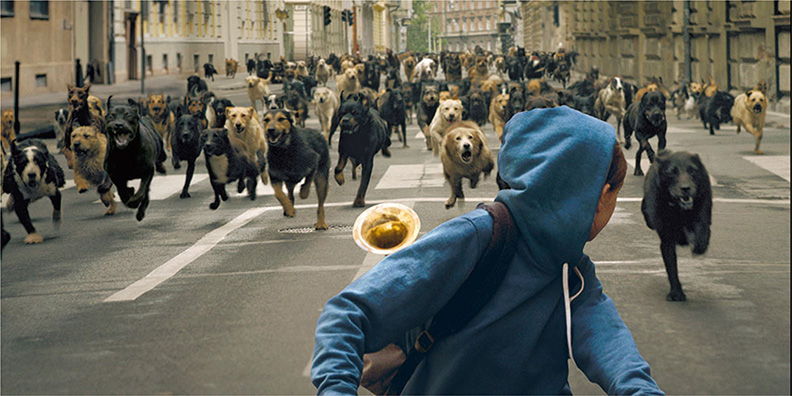White God
Director: Kornél Mundruczó
5:30 and 8 p.m. Friday–Saturday, 2 p.m. Sunday
Oklahoma City Museum of Art
A-
It’d be easy to blow off a film about a canine uprising in Hungary. Stories of revolution and anarchy are historically awkward if told through anything other than humans, and recent movies like James Cameron’s Avatar and Matt Reeves’ Dawn of the Planet of the Apes, though awesome spectacles, don’t really strike a chord much further than the line to the concessions. Conversations we have about these works usually come off as base, linear and not too distinct from the discussions we’ve had before. While you’d think there would be a bit more food for thought from this niche of genre, Kornél Mundruczó’s White God gouges this disposition in its exposed jugular.
In Budapest, Lili (Zsófia Psotta) houses her mother’s abandoned mutt, Hagen, with her reluctant father (Sándor Zsótér). After local authorities attempt to evoke a tax upon the pair in order to keep the dog, Hagen is let loose much to his and Lili’s dismay. As Lili takes a crash course in teenaged debauchery, Hagen is dragged through the dankest and perverse corners of the city’s underbelly, tempered gradually through a desperate struggle for evasion and food while running the risk of euthanasia and death by dog fight. The oddly anthropomorphic humanity of both the girl and her dog is tried, culminating in a violent yet beautiful crescendo.
Each shot is framed like a hypothesis for White God as a whole. The frame subtly sways and, save a few iconic shots, remains at ground level, and with each passing scene the camera’s lens grows more synonymous with an animal’s eyes. In tandem with this, moments with Lili are claustrophobic and intimate — a more naturalistic mode of cinematography much like Steve McQueen’s Hunger. Without the unsteady hand of cinematographer Marcell Rév, the film would be a bit too precise for its dire subject matter.
Speaking of which, the film’s most inherent metaphor isn’t difficult to decipher. The persecution of migrants, xenophobia and the dangerous banes of overzealous nationalism run rampant. Residents and authorities scoff at the “mutts” without hesitation, pouncing on any chance to turn a dollar on the pooches’ plight. Citizens sneer throughout with noises akin to snarls and criminals cheer as captive dogs attack one another’s nape. Both raw and visceral, White God is a noticeable distance from its lighthearted and melodramatic predecessors.
Its performances are generally adequate, with a few obvious standouts. Psotta carries much of the film with the rhythm of a seasoned player. A teen unsure of her place, Psotta’s work bears a striking resemblance to that of Katie Jarvis from Fish Tank, and Lili’s trip through the haze of late adolescence awards the piece with another tie to reality. Psotta is fluid in her role, and Lili’s plight easily forgoes any perceived cultural barrier.
Winners of Cannes’ Palm Dog Award last year, the performances of White God’s furrier stars are unlike anything in film. Thousands of canines flood the streets of Budapest with eerie uniformity. Hagen, portrayed by twin dogs Luke and Body, exhibits a range that may very well exceed many of Hollywood’s veterans. Social commentary floods through these performers without a piece of dialogue, questioning the secure place of “humanity” in those that walk on two legs.
White God should not be missed. Unfortunately, the film’s limited release may make a viewing elusive, at least for now. Still, this visually striking journey through the depths of human depravity and systemic resistance is among the finest to hit the States this year. Just please, leave the leash at home.





